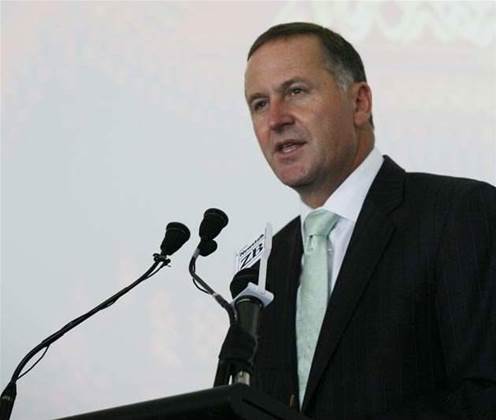New Zealand prime minister, John Key, has entered the debate around regulation of wholesale access to the country's copper telecommunications network, suggesting that proposed price cuts could send infrastructure provider Chorus broke.

Speaking to TVNZ's Breakfast programme last Friday, Key said suggestions that high copper prices are making Chorus shareholders rich are nonsense.
"Chorus aren't making any money out of it at the moment," Key explained, adding that the infrastructure provider's only income stream currently is from the copper network.
"Basically, if the Commerce Commission's ruling stands there's a chance Chorus will go broke, in which case the Ultra-Fast Broadband won't be rolled out," he said.
Key believes that the regulator mis-interpreted a law introduced by his party which requires the telco commissioner to calculate access prices for the copper network on a cost-plus basis instead of the previous retail-minus principle.
Asked if Key's statement was correct, a spokesperson for Chorus told iTnews that information around the copper price cuts is freely available to "all market participants" and that "everyone, including the prime minister, is free to form their view on the information provided."
"Chorus has been very clear on multiple occasions about the impact of reductions on copper pricing for its business, as is appropriate for a listed company operating under continuous disclosure," the spokesperson said.
Key and communications minister Amy Adams' decision to intervene and overrule the regulator has been slammed by interest groups InternetNZ, Consumer and the Telecommunications Users Association of New Zealand as well as some Internet providers as representing corporate welfare and being bad for consumers.
InternetNZ points to figures produced by economic analysts Covec, which forecast that at least NZ$600 million would be transferred from businesses and households to Chorus under the government's proposal to reduce copper pricing by a lower amount than that proposed by the regulator.
The organisation says that by 2020, more than 70 percent of households still won't be using the UFB fibre network. A further quarter of all households will not get access to it, under the government's current rollout plan.
Million dollar earnings impact estimated
In December 2012 the regulator determined to price regulated copper access at a monthly rental fee of NZ$19.08 in urban areas and NZ$35.20 in in non-urban ones (A$16.89 and A$30.96 respectively).
Under the changes, from December 2014 a nationally averaged monthly rental fee of NZ$23.52 (A$20.69) would apply, with unbundled bitstream access (UBA) on top at priced at $8.93 (A$7.85).
For the year ended 30 June 2013, Chorus estimated a hit on earnings before income tax and depreciation of NZ$11 to NZ$12 million (A$9.7 to $10.6 million).
However, from December 2014, Chorus believes its earnings will drop by NZ$150 to NZ$160 million a year (A$132 - A$141 million). The company reported a higher than expected profit of NZ$171 million (A$150.4 million) in its first full financial year and paid a dividend of 15.5 cents (A$0.136) a share.
Chorus was spun off from incumbent Telecom New Zealand in 2011 so that it could take part in the government's UFB project ,and is listed and traded on the Australian and New Zealand stock exchanges.
The telco infrastructure provider was selected by the government to build just over 70 percent of the national UFB fibre to the premises project, subcontracting the work to Visionstream, Downer and Transfield.
As part of the deal, the NZ government through its Crown Fibre Holdings (CFH) agency subsidises the UFB rollout with a direct investment in Chorus worth NZ$929 million (A$817 million). Half of the investment exists as non-voting shares in Chorus, and the rest as interest-free loans over the next 15 to 25 years.
Investors appear to have shrugged off the NZ prime minister's foreboding words, with the share price of Chorus remaining stable last week.


_(33).jpg&h=140&w=231&c=1&s=0)


_(28).jpg&h=140&w=231&c=1&s=0)





 Cyber Resilience Summit
Cyber Resilience Summit
 iTnews Executive Retreat - Security Leaders Edition
iTnews Executive Retreat - Security Leaders Edition
 Huntress + Eftsure Virtual Event -Fighting A New Frontier of Cyber-Fraud: How Leaders Can Work Together
Huntress + Eftsure Virtual Event -Fighting A New Frontier of Cyber-Fraud: How Leaders Can Work Together
 iTnews Cloud Covered Breakfast Summit
iTnews Cloud Covered Breakfast Summit
 Melbourne Cloud & Datacenter Convention 2026
Melbourne Cloud & Datacenter Convention 2026












_(1).jpg&h=140&w=231&c=1&s=0)



